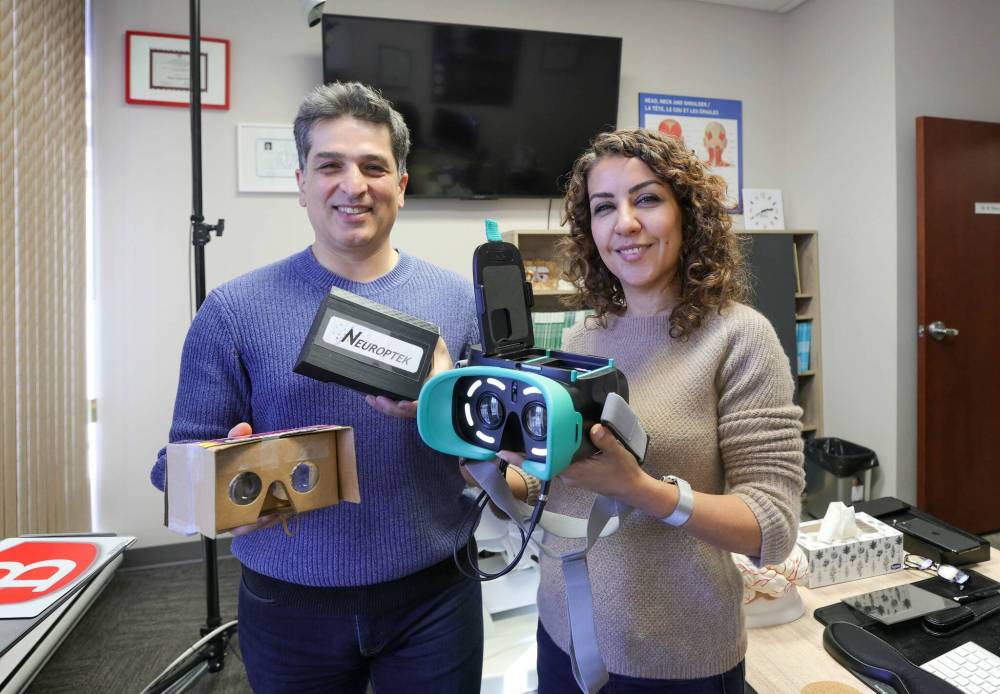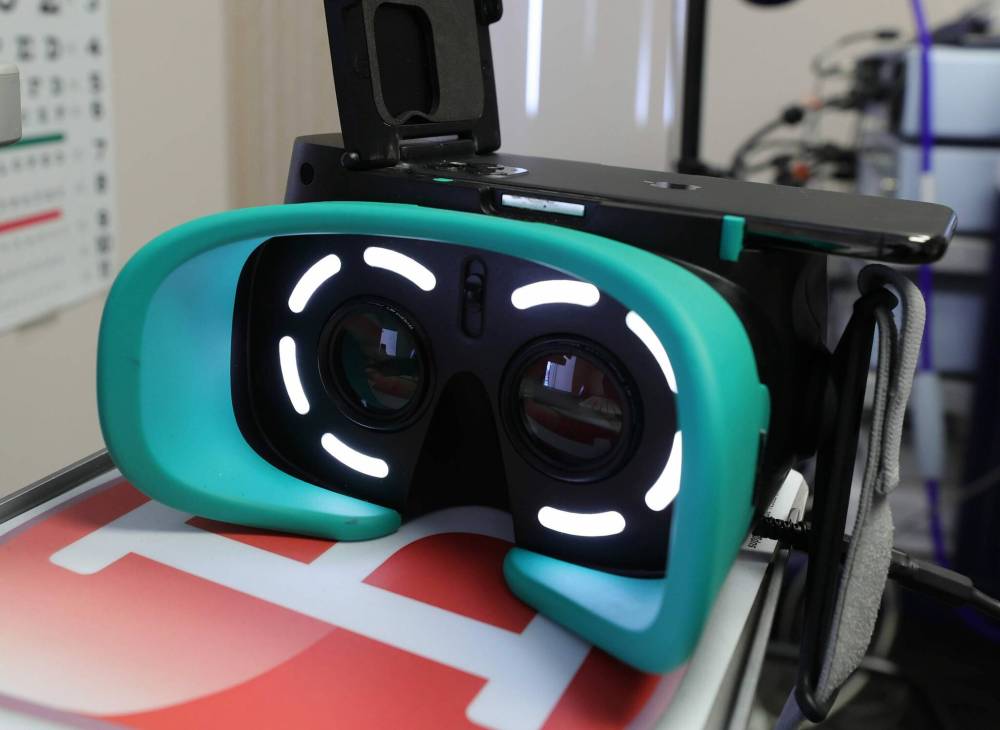Neuro tech looks to the future
Pitch competition showcases startups, ‘new Winnipeg’
Advertisement
Read this article for free:
or
Already have an account? Log in here »
To continue reading, please subscribe:
Monthly Digital Subscription
$0 for the first 4 weeks*
- Enjoy unlimited reading on winnipegfreepress.com
- Read the E-Edition, our digital replica newspaper
- Access News Break, our award-winning app
- Play interactive puzzles
*No charge for 4 weeks then price increases to the regular rate of $19.00 plus GST every four weeks. Offer available to new and qualified returning subscribers only. Cancel any time.
Monthly Digital Subscription
$4.75/week*
- Enjoy unlimited reading on winnipegfreepress.com
- Read the E-Edition, our digital replica newspaper
- Access News Break, our award-winning app
- Play interactive puzzles
*Billed as $19 plus GST every four weeks. Cancel any time.
To continue reading, please subscribe:
Add Free Press access to your Brandon Sun subscription for only an additional
$1 for the first 4 weeks*
*Your next subscription payment will increase by $1.00 and you will be charged $16.99 plus GST for four weeks. After four weeks, your payment will increase to $23.99 plus GST every four weeks.
Read unlimited articles for free today:
or
Already have an account? Log in here »
Hey there, time traveller!
This article was published 04/11/2023 (759 days ago), so information in it may no longer be current.
Within eight minutes, entrepreneurs described headsets detecting concussions and artificial intelligence-powered hands.
They stood on a downtown Winnipeg stage, representing companies from the city and abroad, vying for cash to boost their startups.
Thursday saw Winnipeg’s first neuro-technology pitch competition. It’s part of “the new Winnipeg,” according to a leader in the city’s startup community.

RUTH BONNEVILLE / WINNIPEG FREE PRESS
CEO Dr. Neda Anssari (right) and her husband, Dr. Behzad Mansouri COO of Neuroptek, holding their invention called EyeMirage.
“It’s not just in Winnipeg for Winnipeggers,” said Marshall Ring, CEO of the Manitoba Technology Accelerator. “People come here as a destination.”
He sat in the Metropolitan Entertainment Centre as the venue filled. More than 100 people attended, listening to five startups explain their neuro-technology plans.
One company was based in the Eurasian country Georgia; another had roots in Nova Scotia.
“Neuro tech will only be going up,” said Chris Friesen. “We’re going to find better and better ways to leverage our understanding of the nervous system.”
He represented Axem Neurotechnology, a company he co-founded in Nova Scotia. Friesen now lives in Winnipeg; the company is still headquartered in the east.
Friesen took the stage, explaining his product to a panel of judges while a clock counted five minutes.
“Providers send patients home to fend for themselves, to procure outpatient services across a fractured ecosystem of vendors,” he told the crowd.
He spoke of stroke recovery patients. His solution: a virtual service connecting patients with health-care professionals, and virtual recovery tracking.
Under Axem Neurotechnology’s system, stroke survivors would be discharged from the hospital with a tablet. An Axem Neurotechnology app would connect the user with occupational therapists, physical therapists, counsellors and other relevant health-care professionals.
“Basically (it) puts all the best people you would need at someone’s fingertips,” Friesen said.
Axem’s technology would also allow stroke survivors to do rehabilitation exercises on their own while being monitored.
The company has a medical device, which will be incorporated with the services, currently being put through trials.
It’s launching a pilot of the online services in Massachusetts next year. Harvard University connections — whom an investor introduced — will refer patients, Friesen said. He’s expecting 25 to 50 patients to begin. Axem is in the process of hiring health-care professionals.
“We know that a tech enabled health-care service for stroke is going to be a really, really big market. It’s going to be competitive,” Friesen stated.
There’s a need to scale fast, he said. He told judges the company has raised $2 million in investment.
They asked three minutes’ worth of questions and, at the event’s close, crowned him pitch winner. He walked away with $25,000 (money the Ontario Brain Institute contributed to the contest).
“Axem was the closest to investor return,” said Paul Card, one of four judges and Neo Financial’s managing director.
Axem Neurotechnology projects a serviceable market of about 415,000 patients in the United States alone, with an annual revenue potential of $12 billion.
“They were all really good,” Card said of the pitchers. “Super hard decision, and it actually took us quite a while to pull out the final choice.”
A Manitoba-based startup won $5,000 — the people’s choice pick.
“We’re humbled,” said Dr. Neda Anssari, chief executive of Neuroptek.

RUTH BONNEVILLE / WINNIPEG FREE PRESS
Neuroptek’s EyeMirage counts eye movements to aid in the diagnosis of a concussion. It’s billed as a simple yet sophisticated diagnostic devise that is a game changer for the industry.
Her colleague Dr. Behzad Mansouri pitched the prototype — EyeMirage — to the judges. Their headset, which looks similar to a virtual reality headset, will be able to aid in concussion diagnosis and a variety of eye tests, they said.
The technology uses cellphones to record and analyze eye movements. It can be strapped on people anywhere needed — such as a field trip or hockey rink — for a quick concussion check, Mansouri stated.
“Our hope is that this device will be readily available to every individual,” he said, likening it to buying a blood pressure monitor from a pharmacy.
The doctors are preparing for EyeMirage clinical trials while drumming up investment. They work at the Brain, Vision and Concussion Clinic.
“We have a huge shortage of health-care professionals,” Mansouri noted.
There are less than four ophthalmologists per 100,000 Canadians, with projections of the number of professionals lessening. Services in northern and remote regions are harder to find, Mansouri said.
He envisions EyeMirage assisting with eye exams and concussion analysis in remote areas. The team estimates a single device to cost $399, though prices are preliminary.
Vladimir Bessonov travelled from Montreal, representing his Georgia-based company, for the pitch Thursday.
He called the Manitoba Technology Accelerator “one of the best” of its kind around. It’s why Alvi Labs entered the competition with its idea of an artificial intelligence-powered prosthetic hand, Bessonov said.
An armband sensing the user’s motions and muscle activations would inform the hand about how to move its fingers and wrist.
“In reality, it’s very simple and very fascinating,” Bessonov said.
The company has created a control system and are looking to build the hand prototype, he added.
Other pitches included a wrist device using vibrations to help stroke survivors regain hand function and an intra-operative imaging device to assist with neuro surgeries.
The Bioscience Association of Manitoba, Economic Development Winnipeg, Startup TNT and Manitoba Technology Accelerator partnered to create the event. The MTA and the Ontario Brain Institute sponsored.
“As a community, if we come together and all co-operate, we can do regional things,” Ring said. “If we stay in silos, we can only do things in Winnipeg.”
Robyn Waddell, 22, watched the neuro-technology pitches with hope for the future.
“I want to do this someday,” the software developer student said. “Technology is developing so fast. It’s really untapped, especially the brain.”
gabrielle.piche@winnipegfreepress.com

Gabrielle Piché reports on business for the Free Press. She interned at the Free Press and worked for its sister outlet, Canstar Community News, before entering the business beat in 2021. Read more about Gabrielle.
Every piece of reporting Gabrielle produces is reviewed by an editing team before it is posted online or published in print — part of the Free Press‘s tradition, since 1872, of producing reliable independent journalism. Read more about Free Press’s history and mandate, and learn how our newsroom operates.
Our newsroom depends on a growing audience of readers to power our journalism. If you are not a paid reader, please consider becoming a subscriber.
Our newsroom depends on its audience of readers to power our journalism. Thank you for your support.

